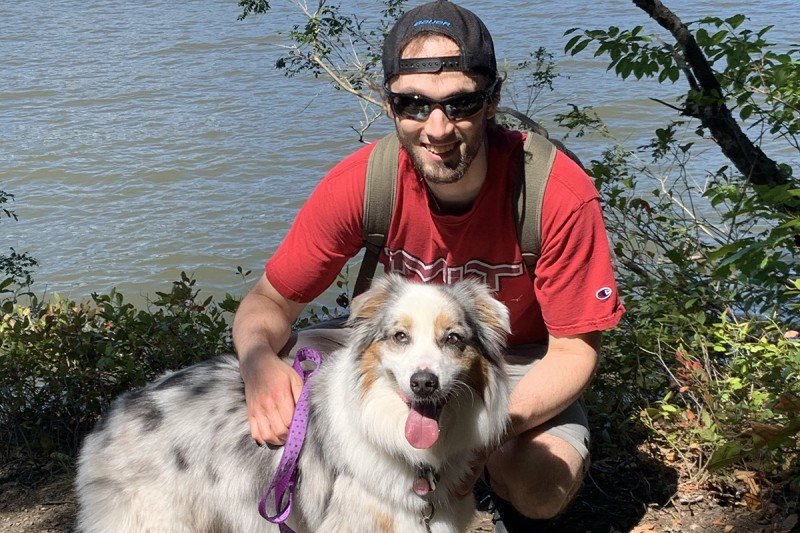
Michael Rosensweig with Snow, photographed in the summer of 2020, before his latest disease recurrence
When Michael Rosensweig learned in May 2021 that his acute myeloid leukemia (AML) had returned for a fourth time, it was difficult news to receive. He had been in remission for more than eight years.
This time, though, he had an option for a new and less grueling treatment. Rather than face another round of intensive chemotherapy requiring weeks of hospitalization, Michael found out that he qualified for a groundbreaking clinical trial (research study) of an experimental targeted therapy called revumenib (then known as SNDX-5613). The drug, which is in a new class called menin inhibitors, was developed based on research conducted at Memorial Sloan Kettering Cancer Center (MSK).
Positive Leukemia Trial Results Using Menin Inhibitors
On August 9, 2024, Eytan Stein, MD, the Chief of the Leukemia Service at MSK and an expert in early drug development, published the pivotal results from the Phase 2 portion of the first-ever clinical trial of revumenib. According to the findings, published in the Journal of Clinical Oncology, 63% of patients in the trial responded to the drug,
All patients in the study had a molecular changes in their cancer called a KMT2A rearrangement. These changes can be found in both children and adults with AML and acute lymphoblastic leukemia (ALL).
“People with these types of alterations tend to have very aggressive disease,” says Dr. Stein, Director of MSK’s Program for Drug Development in Leukemia. “What we’ve seen in this study is very promising, especially for this patient population.”
Based on earlier data from the trial, on December 6, 2022, revumenib had been granted Breakthrough Therapy Designation from the US Food and Drug Administration (FDA), a recognition that acknowledges the potential for this new drug. The FDA is expected to decide by the end of the year whether to approve it.
Menin Inhibitors Are a New Targeted Therapy for Leukemia in Children and Adults
The multicenter, combined phase 1/2 trial has so far enrolled 94 patients, with 57 of them far enough along in their course of treatment to be included in this analysis. All of them had seen their leukemia come back after other treatments, like Michael, or had never responded well to traditional chemotherapy drugs in the first place.
KMT2A rearrangements allow a protein called menin to drive cancer growth. By blocking the interaction between menin and the mutation, revumenib turns leukemia cells back into normal blood cells.
The early research on menin inhibitors was done by Scott Armstrong, MD, PhD, when he worked at MSK in the mid-2010s. Also participating in that research was leukemia specialist and physician-scientist Ross Levine, MD, MSK’s Senior Vice President for Translational Research.
Revumenib Leads to a Better Quality of Life During Treatment for Leukemia
Revumenib is a pill that’s taken at home. “Being able to do treatment from home and just be normal for a while was nice, as opposed to being stuck in a hospital bed for months,” Michael says. “The drug did what it was supposed to do and was much easier on my body.”
Michael says he experienced no side effects, which was a relief compared with his earlier chemotherapy treatments. Overall, the side effects observed in the trial were not serious, and no patients had to drop out because of them.
“Menin inhibitors appear to be very well tolerated and are easy to take,” Dr. Stein says. “This is everything you want in a targeted therapy.”
Revumenib is also relevant for pediatric leukemias, which frequently carry the genetic changes targeted by the drug. Responses have been seen in some children with relapsed leukemias treated on this trial, according to pediatric oncologist Neerav “Neal” Shukla, MD, of MSK Kids.
Revumenib Offers More Options for Treating Aggressive Leukemias
After getting revumenib, Michael went on to receive a stem cell transplant — his fourth one — in October 2021. It was performed by hematologic oncologist Sergio Giralt, MD, who is the Deputy Division Head of MSK’s Division of Hematologic Malignancies.
Michael received stem cells from an unrelated donor who was found in a public registry. The software engineer was first diagnosed with AML when he was a junior at the Massachusetts Institute of Technology. He is now back at work and doing well.
“The ultimate goal of these new treatments is to cure our patients,” Dr. Stein says. “For many, a transplant may be the best option. But for others, we hope to eventually develop combination therapies that will help to avoid, or get around, drug resistance.”
Understanding How Resistance to Revumenib Develops
An earlier paper published in Nature on March 15, 2023, described the genetic changes in the leukemia that led to drug resistance. This research used patient samples as well as cells grown in the lab. The co-senior authors of that study were Dr. Armstrong, Dr. Levine, and MSK leukemia specialist and early drug development specialist Sheng Cai, MD, PhD.
“The level of response that we saw in patients enrolled on the trial was terrific, but not 100%. Whenever we test the efficacy of a novel cancer therapy by itself, we anticipate resistance mechanisms in this setting,” Dr. Cai says. “What these studies teach us — in particular, when these leukemias are forced to mutate to evade this drug — is that we are, in fact, getting to the Achilles’ heel of this aggressive disease.”
He adds: “That is a powerful lesson, and this research offers new opportunities to develop strategies to overcome this resistance, which is the next frontier in targeted therapies.”






